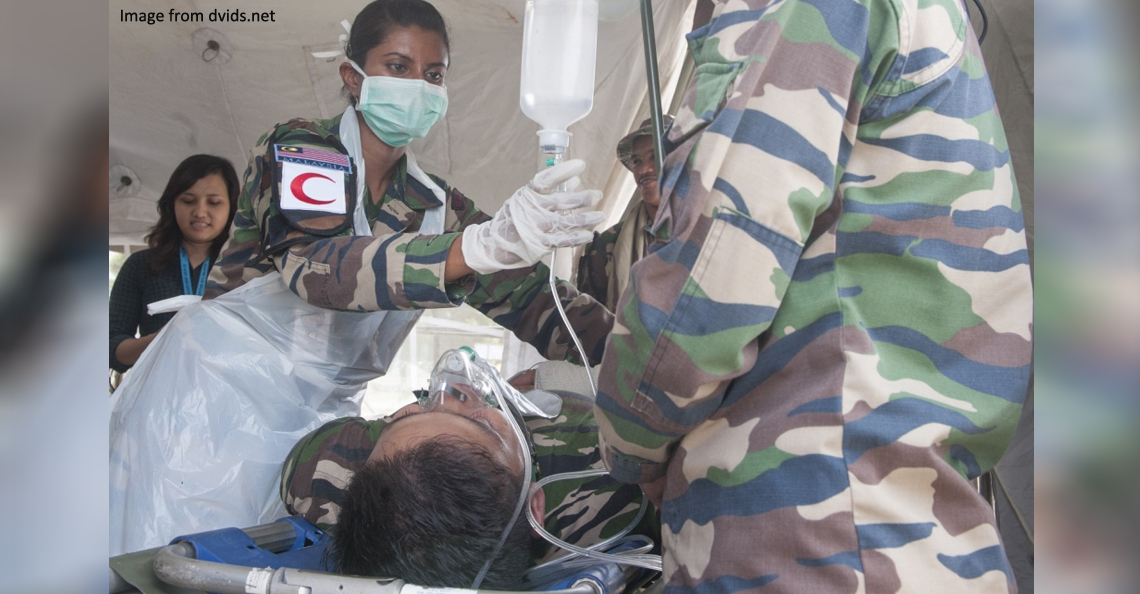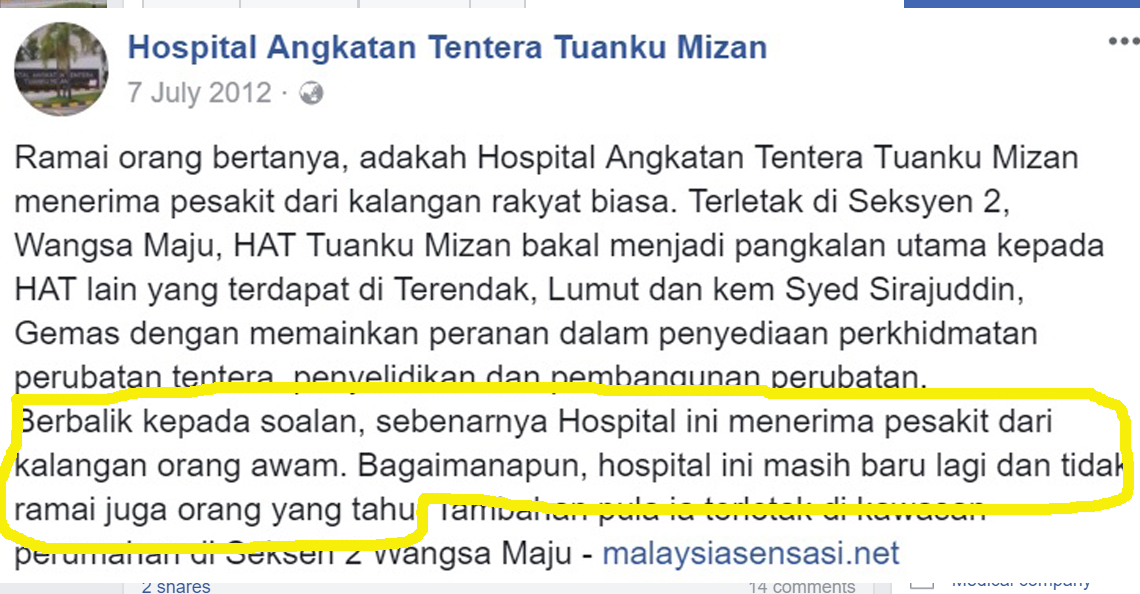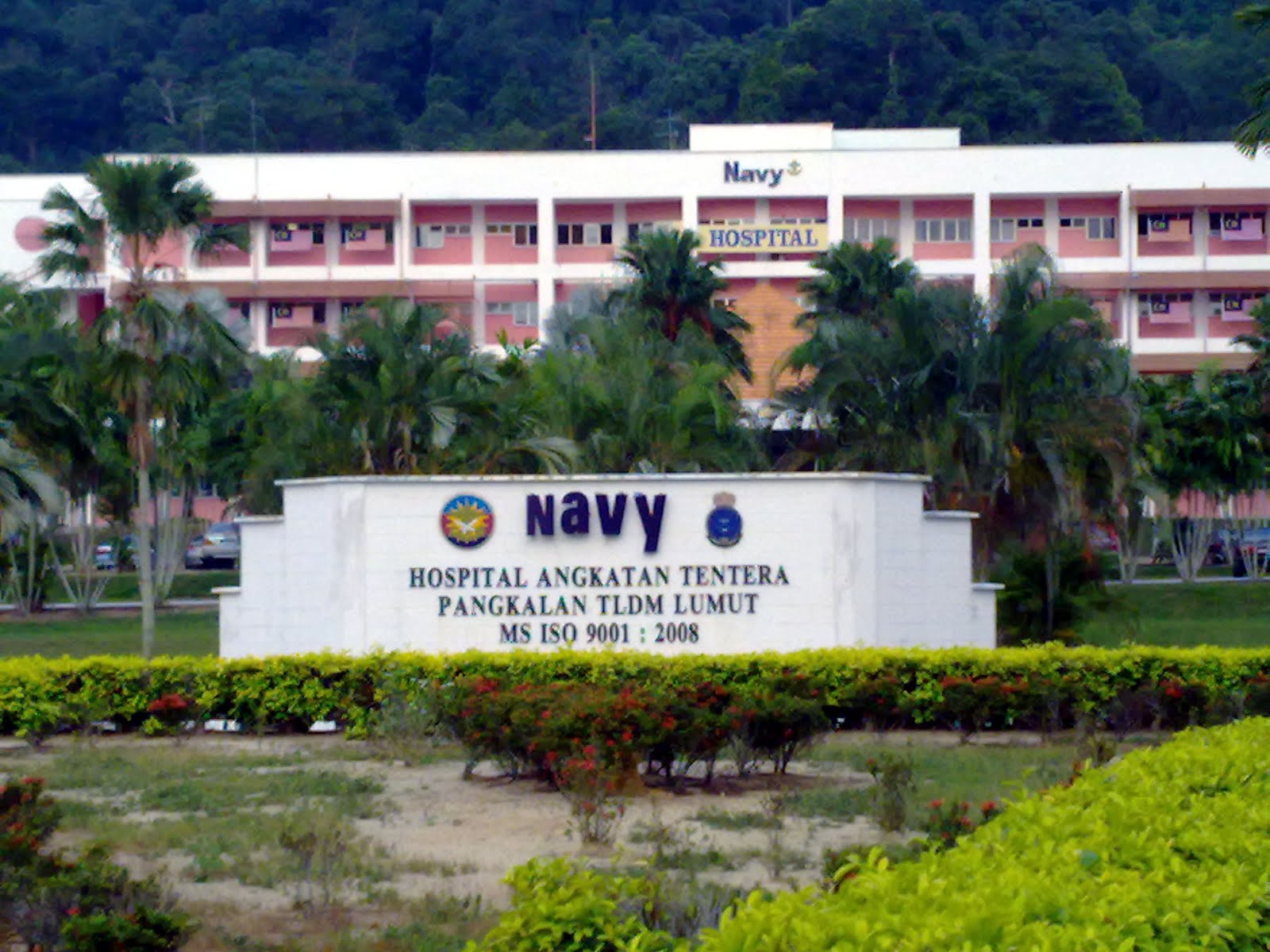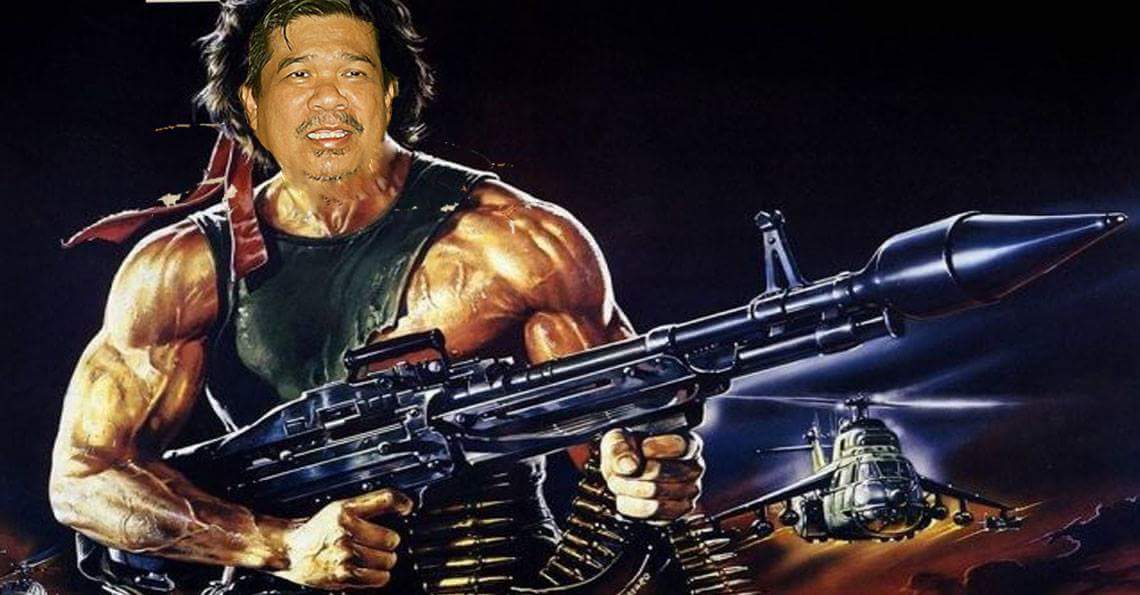If you become sick, can you seek treatment from a Malaysian military hospital?

- 718Shares
- Facebook654
- Twitter8
- LinkedIn8
- Email12
- WhatsApp36
As Malaysians, we enjoy a wide variety of health care options in Malaysia. In government hospitals and clinics, we can get all kinds of treatments for as low as RM1! With private healthcare on the other hand, Malaysia’s reputation for medical tourism is actually one of the more popular destinations in the world, receiving 921,500 health travelers in 2016, and making RM4 – 5 billion from it.
But did you know there’s something called military hospitals? Earlier this year, two headlines regarding military hospitals were brought to the media’s attention. In January, Defense Minister Datuk Seri Hishammuddin Tun Hussein said that all military hospitals in Malaysia would be upgraded under the Malaysian Armed Forces (MAF) Health Services Transformation Plan 2017 – 2050.

Then in February, The Retired Senior Police Officers Association of Malaysia (RESPA) submitted their proposal to the government that Malaysian police (PDRM) should get their own dedicated hospitals as well.
“At the moment, the armed forces enjoy special medical treatment in their own hospitals. We feel it is about time the PDRM has its own medical centre,” – Datuk Meor Chek Hussien Mahayuddin, spokesperson for RESPA, quoted from The Star
But, what exactly are military hospitals? Are they like top secret facilities specially made for soldiers and veterans? Are the gates guarded by soldiers with M-14s and mounted machine guns?
Military Hospitals are government hospitals, but… WITH A TWIST
Aside from the occasional news article about military hospitals, we found that it was almost impossible to find any other sources of information about it. Maybe it was because everyone assumed too much and it became common knowledge? Or maybe the military is covering up the tracks of its wounded?!

Either way, we sought the help of The Malaysian Armed Forces Chinese Veterans Association (MACVA) and Captain (Rtd) Wan Hock Leong, formerly in the Rejimen Semboyan Diraja (Malaysian Signals Regiment) to help us understand what military hospitals really are. The first thing on our minds was: What do military hospitals do?
MACVA and Captain Wan both told us that military hospitals mainly serve military people. This means soldiers from all three branches of the Malaysian military, including those who are currently serving, undergoing training, and the veterans. The hospital privilege is also extended to the military personnel’s immediate family members, or those who are dependent on them.
“The primary objective of the Armed Forces Health Services is to provide the best services available to render every service personnel optimally fit for active duty. ” – MACVA told CILISOS
Generally, the hospitals would also be built near to major military cantonments or bases, but they are not involved in front line missions. For that, it would be the duty of a Field Ambulance or a Field Hospital that will be established for the purpose of a particular operation, and would disbanded after the ops.
But what about non-military people/civilians? MACVA and Captain Wan told us that civilians are treated in military hospitals for emergencies only. This seems to check out with news articles we found on the internet… except for THIS Facebook post from Tuanku Mizan Military Hospital:

We called the military hospital to clarify, and the nice (but frightened) lady on the phone told us that the hospital would only treat “normal people” in cases of emergency, which means anything that comes to the hospital emergency ward in an ambulance. To be fair, the post was more than 5 years ago, so maybe policies might have changed.
There are only five military hospitals in Malaysia. Is that too much, or too little?

FOUR of those hospitals are in Peninsular Malaysia, and ONE is in East Malaysia:
- Hospital Angkatan Tentera (HAT) Terendak, Malacca
- HAT Tuanku Mizan, Kuala Lumpur
- HAT Lumut, Perak
- HAT Wilayah Kota Kinabalu Teluk Sepanggar, Sabah
- HAT Gemas, Negeri Sembilan
Among them, Tuanku Mizan hospital is actually the biggest and newest, having just begun operations back in 2010. The hospital costs RM270 million to complete, and it is the biggest and most advanced military hospital among the others.
“We now have 282 beds and 585 staff and hope to increase this number to more than 1,000 so that we can operate and run the hospital to its fullest capacity.” – Datuk Dr Ya’akop Koming, Commanding Officer of Tuanku Mizan Military Hospital, quoted from The Star
Almost seven years later (2017), plans for a veteran hospital was announced in the 2018 Budget. Defense Minister Datuk Seri Hishammuddin later revealed that RM500 million will be spent on the hospital, which will be located in Ipoh. Veterans Association of Malaysian Armed Forces president Admiral (Rtd) Tan Sri Mohd Anwar Mohd Nor said that military hospitals are overwhelmed from having to treat current servicemen AND around 300,000 veterans.
“It takes a while before we can even see a doctor, so we welcome the veterans’ hospital. Hopefully, it will correct the distribution of patients seeking treatment.” – Admiral (Rtd) Tan Sri Mohd Anwar Mohd Nor, quoted from The Star

Of course, veterans could visit normal government hospitals too. But military hospitals not only bear all cost of treatment for military servicemen, but they would also be more specialised in treating disorders that veterans could have contracted in training or in service. According to MACVA, even all doctors in military hospitals are military doctors, while other staff are a mix of military and civilian personnel.
As terrible and destructive as wars are, military medicine actually brought society some pretty cool inventions. In fact, many of the common day treatments and medical practices were “transferred” to public medicine after it was conceived or improved because of some war. For example, a doctor developed significantly improved methods of storing and transporting blood for the British soldiers during World War 2. His work not only saved thousands of lives, but also gave rise to blood banking, an essential component for all hospital in the world today.
There are Malaysian veterans who need assistance, but may not know where to get it
Unless wars can magically disappear from the world, every country will most likely need a military force, and every soldier and hospital that comes with it. Sadly, in the undesirable fighting and conflict that comes with war, it’s the military men and women who put their lives on the line to preserve peace, so it might not be unreasonable for the basic health needs of the military personnel and their families to be looked after by the country they are fighting for.
But as we discovered from before, it’s difficult for help to find its way to veterans if the system doesn’t know where they are or how to contact them. So even if we have great hospitals for veterans, veterans might not know that they could visit them. In an article we did earlier, one of the main goals of these armed forces veterans society is to find veterans in Malaysia and get them registered so that the societies can easily provide them with assistance (if they need any) later on. Veteran societies like Kumpulan Veteran Tentera Tidak Berpencen 1 Malaysia (KVTTB) sometimes have to hold roadshows to inform veterans of their rights.
“One of the problems encountered in locating the veterans is that most of them are residing in the deep rural and interior areas which are hard to reach.” – Lt Col Monday Juhid, JHEV’s Sarawak branch director for the Borneo Post.
The Chinese association MACVA told us that all military establishments (including military hospitals, in this case) of the Malaysian Armed Forces are actually under the Ministry of Defense. This makes Captain Wan’s suggestion to collect details of veterans before they even leave the armed forces seem more sensible, instead of scrambling to find them like what’s being done now. Hopefully, when the veterans hospital does get constructed, veterans will be able to find their way to it.
- 718Shares
- Facebook654
- Twitter8
- LinkedIn8
- Email12
- WhatsApp36

